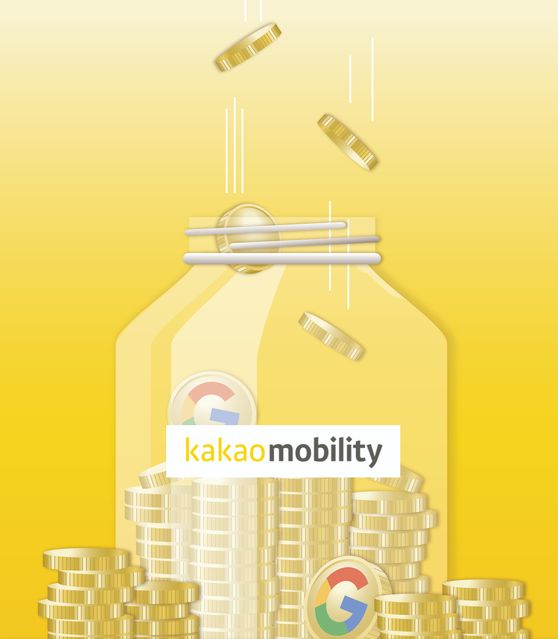
Illustration = Designer Heo Yun-ju
Global Big Tech Google has made a strategic investment (SI) in Kakao Mobility. This is the first time that Google has invested directly in a Korean company since it acquired the blogging platform’Teter & Company’ in 2008.
Invested in Korean companies in 13 years
Kakao seems to be for collaboration rather than money
Google seems to strengthen the map service
Becomes a fierce battlefield for’dinosaurs’ such as SKT + Uber
Kakao Mobility announced on the 1st that it has attracted 56.5 billion won of strategic investment from Google. Google acquired 97,848 new shares of Kakao Mobility through a paid-in capital increase method allocated to a third party. Google’s stake is 1.69%. When the acquisition is completed, Google will become the fourth largest shareholder of Kakao Mobility, following Kakao (63.4%), Tpg Consortium (28.3%), and Carlyle Group (6.6%). “We plan to maximize synergy so that we can grow into a global key player through long-term cooperation with Google.” “We are pleased to be able to support Kakao Mobility, which provides various types of mobility services to Korean users,” said Frank Lin, Head of Investment in Northeast Asia, Google.

Kakao Mobility Investment Attraction Status. Graphic = Reporter Kim Young-ok [email protected]
Kakao Mobility’s Big Picture
This is the first time that Kakao Mobility has attracted strategic investment. If the investment received because of the need for funds, the 720 billion won raised before, this time the purpose of collaboration is stronger than money.
①’Taxi+@’ required
Kakao Mobility is the largest mobility platform in Korea that dominates both supply and demand markets. On the supply side, it secured 230,000 taxi driver members waiting for a taxi call, and secured direct management (900) and affiliated taxis (16,000), and gathered 28 million users on the demand side. In particular, last year, the domestic mobility market was reorganized to focus on taxis, and it rose to the top of the certified mobility.
As it is the No. 1 platform, content expansion is now required. To build service-type mobility (MaaS), taxis and proxy alone are not enough. This year, it is the background of increasing collaboration in all directions related to mobility, such as trains (KORAIL), autonomous vehicles (Autonomous A2G), vehicle management (Bulls One), and rental cars (acquisition of deal cars). An official from the Uber mobility industry said, “Kakao Mobility will not lack money as it received an investment of 220 billion won from Carlyle last month and recently started a paid service for taxi drivers. “I’m trying to grow it.”
②’Autonomous driving’, the first priority
Waymo, a subsidiary of Google, is a global leader in autonomous driving technology. There is also a prospect that Kakao Mobility will collaborate with Google in this area, both inside and outside the industry. Kakao Mobility obtained a temporary autonomous driving permit in March last year, and is currently operating a commercial service for calling autonomous vehicles in Sejong City. An official at Kakao Mobility said, “It is ultimately to discover new technology-based business opportunities and create growth engines in the domestic and global markets.”
Kakao Mobility announced that it will advance cloud-based artificial intelligence (AI) technology with Google and promote comprehensive cooperation related to cloud IoT. In order to improve the user experience, collaboration on various OS (operating system) software is also promoted. However, other collaboration possibilities are also discussed in the market.
① Map
The basis of mobility services is maps. This is because the next level of service is possible only when information about where and what is located is accurate. When Google launched the Google Maps service in 2005, it has pioneered a new area of search-based mobility. However, the Google Maps Directions function, which is serviced worldwide, cannot be used in Korea. Exporting domestic maps to Google data centers overseas requires government permission, but the South Korean government forbids it due to security concerns. This is why location-based services using Google Maps are not activated in Korea. Partnering with Kakao Mobility can compensate for these weaknesses. However, Kakao Mobility said, “It is the initial stage of discussion, so there is only a big direction, and it is not the stage where we talked about specific collaboration.
② Algorithm advancement
Urban traffic data, which is required to advance autonomous driving algorithms, is also an area that Google needs. Google has a lot of driving data in the United States with a wide road environment, but it lacks data on Asian cities in a narrow and complex road environment.
A representative of a domestic mobility start-up said, “If you collaborate with Kakao Mobility, which has accumulated mobility data for many years in various areas such as taxi, navigation, and deputy, Google will be able to get the necessary help in terms of data.”
Korea’s mobility has become a global dinosaur battlefield

If you snap the QR code, you can subscribe to the’Business Newsletter Pack’.
As Kakao Mobility and Google join hands, competition in the domestic mobility market is expected to intensify. SK Telecom’s subsidiary Tmap Mobility and Uber’s joint venture, UT LLC, were also officially launched on the 1st. Uber is reportedly planning to invest more than $100 million (11.3 billion won) in the joint venture. Google’s subsidiary Waymo has been fiercely competing with Uber in 2017, filing a lawsuit for stealing technology related to autonomous vehicles.
Cha Doo-won, director of the Mobility Research Institute, said, “If there was competition between domestic companies until last year, global funds will also enter the Korean market, resulting in fierce competition.”
Reporter Park Min-je [email protected]

Pack
![]()
